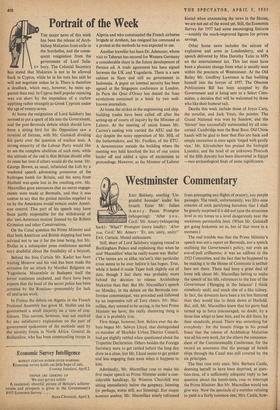Portrait of the Week
At home the resignation of Lord Salisbury has seemed to put a spark of life into the Government, and the post-Bermuda debate which should have been a sitting bird for the Opposition saw a reversal of fortune, with Mr. Gaitskell dividing his party over the question of nuclear tests. A strong minority of the Labour Party would like to see the complete abolition of such tests, while the attitude of the rest is that Britain should offer to cease her tests if others would do the same. Mr. George Brown, as usual, infuriated the Left by a weekend speech advocating possession of the hydrogen bomb for Britain, and the news from Hatfield was-quite lost in the resulting row. Mr. Macmillan gave assurances that no secret engage- ments were made at Bermuda, and that it was untrue to say that the guided missiles supplied to us by the Americans would remain under Ameri- can control. This part of his speech may have been partly responSible for the withdrawal of the 'anti-American motion' framed by Sir Robert Crimston and other Conservatives.
On the Canal question the Prime Minister said that both American and British shipping had been advised not to use it for the time being, but Mr. Dulles in a subsequent press conference seemed very doubtful about the feasibility of a boycott.
Behind the Iron Curtain Mr. Kadar has been visiting Moscow and his visit has been made the occasion for an attack by Marshal Bulganin on Yugoslavia. Meanwhile in Budapest itself the terror' continues unabated, and there have been reports that the head of the secret police has been arrested by the Russians—presumably for lack of zeal in his work.
In France the debate on Algeria in the French National Assembly has given M. Mollet and his goiiernthent a small majority on a vote of con- fidence. This success, however, was not marked by any satisfactory explanation on the part of government spokesmen of the methods used by the security forces in North Africa. General de Bollardiere, who has been commanding troops in Algeria and who commanded the French airborne brigade at Arnhem, has resigned his command as a protest at the methods he was expected to use.
Another traveller has been Dr. Adenauer, whose visit to Teheran has secured for Western Germany a considerable share in the future development of Persian oil. A trade agreement has been signed between the UK and Yugoslavia. There is a new cabinet in Siam and still no government in Indonesia. A paper on internal security has been agreed at the Singapore conference in London. In Paris the Quai d'Orsay has denied the Suez revelations contained in a book by two well- known journalists.
At home the strikes in the engineering and ship- building trades have been called off after the setting-up of courts of inquiry by the Minister of Labour. At the meeting of union bosses Mr. Carron's casting vote carried the AEU and the day despite the noisy opposition of Mr. Hill, of the boilermakers, and Mr. Foulkes, of the ETU. A demonstrator outside the building where the meeting was held knocked the hat of one union leader off and added a spice of excitement to proceedings. However, as the Minister of Labour hinted when announcing the news in the House, we are not out of the wood yet. Still, the Economic Survey for 1957 had some encouraging features —notably the much-improved figures for private savings.
Other home news includes the seizure of explosives and arms in Londonderry, and a speech delivered by Miss Dorothy Tutin to MPs on the entertainment tax. This last must have been a pleasant change from what is usually seen within the precincts of Westminster. At the Old Bailey Mr. Geoffrey Lawrence is fast building himself into the lawyer of 1957. The Obscene Publications Bill has been accepted by the Government and is being sent to a Select Com- mittee, a decision that will be welcomed by those who like their humour salt.
Deaths this week include those of Joyce Cary, the novelist, and Jack Yeats, the painter. The Grand National was won by Sundew, and the `blower' ban successfully surmounted by all con- cerned. Cambridge won the Boat Race. Old China hands will be glad to hear that flies are back and simple recreation is once again `tinged with gaudy vice.' Mr. Khrushchev has praised the biologist Lysenko; and the head of an unknown Pharaoh of the fifth dynasty has been discovered in Egypt —two archaeological finds of some significance.












































 Previous page
Previous page